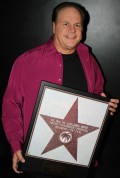Henry Stone, whose music career has spanned the entirety of the rock era, died on Thursday at Mercy Hospital in Miami. He was 93.
Stone was born in the Bronx but brought up in an orphanage in Pleasantville, NY. Originally a trumpet player, he was part of a racially integrated band while in the Army between 1943 and 1947.
After the service, Stone moved to Los Angeles where he worked for Jewel and Modern Records, traveling the country doing promotion. Not satisfied to work for others, he moved to Miami a year later, starting his own distribution company (Seminole) and recording studio (Crystal).
In 1952, he added record companies (Rockin’ and Glory Records) to his portfolio where he had his first major hit with the Charms Hearts of Stone in association with King/DeLuxe Records. He was also one of the first to record a young Ray Charles with the tracks released on Rockin’ and leased to DeLuxe.
Never content with his present enterprises, Stone expanded again in 1955 with two publishing companies (Pelican and Sherlyn) and more labels (Chart and Dade) where he released music from Sonny Thompson, the Champions, the Evergreens and others.
In 1960, he released (Do the) Mashed Potato by Nat Kendricks and the Swans, which also happened to be James Brown’s backup band, on Dade, hitting 8 on the R&B charts. Brown, himself, played piano on the session.
More labels followed during the 60’s and early-70’s including Glades, Marlin and Alston Records along with one of the most successful distribution companies in the business, Tru-Tone (eventually just Tone).
By the early-70’s, Stone’s enterprises started to turn out hits that transcended the R&B charts and became major pop hits including Betty Wright’s Clean Up Woman (1971 / #6 Pop / #2 R&B), Beginning of the End’s Funky Nassau (1971 / #15 Pop / #7 R&B), Timmy Thomas’ Why Can’t We Live Together (1972 / #3 Pop / #1 R&B), Latimore’s Let’s Straighten It Out (1974 / #31 Pop / #1 R&B), Gwen McRae’s Rockin’ Chair (1975 / #9 Pop / #1 R&B), Peter Brown’s Do You Wanna Get Funky With Me (1977 / #18 Pop / #3 R&B) and Bobby Caldwell’s What You Won’t Do For Love (1978 / #9 Pop / #6 R&B).
Stone’s career peak came when the news broke that a merging of Atlantic, Warner Brothers and Elektra would start doing their own distribution, cutting out Tone. Henry refocused on recording and producing, forming T.K. Records with Steve Alaimo. A warehouse worker at Stone’s facility, Harry Wayne Casey, and one of Henry’s engineers, Richard Finch, were paired up and began writing and performing together, eventually becoming K.C. and the Sunshine Band. Between 1973 and 1980, the group had sixteen top forty R&B hits and eleven on the Pop charts including five number 1’s, Get Down Tonight, That’s the Way (I Like It) (both 1975), (Shake, Shake, Shake) Shake Your Booty (1976), I’m Your Boogie Man (1977) and Please Don’t Go (1979). Even before K.C. and the Sunshine Band broke big, Casey, Finch and Stone collaborated on what some consider the first major disco hit, George McCrae’s Rock Your Baby.
When disco crashed, so did T.K. Records which closed its doors in 1981 but, un-phased, Stone jumped into a new business with Morris Levy of Roulette Records with their Sunnyview Records which recorded artists from the early hip-hop group Neucleus to the Dixie Hummingbirds and Eartha Kitt.
Stone continued in the record business into later life and, in 2004, was the recipient of the first Pioneer Award from the Dance Music Hall of Fame. He also wrote the book The Stone Cold Truth on Payola! Cash, Cocaine, Cars and the Music Biz.
Stone is survived by his wife, Inez, seven children and fourteen grandchildren.
more from vvnmusic.com















